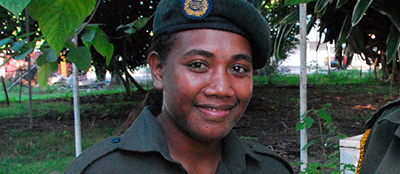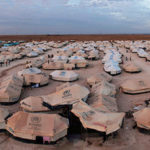The literature on border security in North Africa has several key themes: security and terrorism; migration; and goods trafficking. These issues are all intertwined. Migration and trafficking tend to follow the same geographical routes, which or may not also include weapons smuggling for extremist groups. In addition, radicalists’ movements across borders frequently interact ...» more
Security & justice
Livelihoods in fragile contexts
There is strong literature on both livelihoods in general and livelihoods in fragile contexts, presenting conclusions and lessons from programmes and synthesising evidence from other contexts. This review draws mainly on lessons learned in the field, rather than rigorous evidence of impact. There are few impact studies conducted on programmes in fragile environments, as ...» more
The impact of integrated missions on humanitarian operations
Key findings Evidence remains scarce, problematic and contested. There is at least limited agreement on the following: Integration has had both negative and positive effects. Effects vary by individual actor, type of actor (UN agencies are more affected) and contexts (mission, country, point in time). Protection of civilians: Possible positive impacts: shared objectives ...» more
Safe spaces for girls: six-country mapping
This review presents a broad overview of the most prominent and well-evidenced programmes providing safe spaces for girls in six selected countries. Key findings The criteria for defining a ‘safe space’ followed the Population Council’s guidance, and the following programmes all contain these elements: A physical space where adolescent girls (10-19 years old) meet regularly An ...» more
Policy responses to criminal violence in Latin America and the Caribbean
Combatting the threat posed by transnational and domestic criminal organisations has become a critical concern of governments throughout Latin America and the Caribbean. Ideas of how to reduce crime and organised violence in this region vary between those who advocate for state-security led approaches and those who argue for approaches that tackle the causes of crime and the ...» more
Organised violence and its impacts in Central America’s northern triangle
A range of criminal organisations operate in Central America’s northern triangle. Violence conducted by criminal organisations is one manifestation of a broader culture of violence that is endemic to many Central American societies (UNODC, 2007). At the personal and societal level: The extensive loss of life through homicide is the most obvious humanitarian outcome of violence ...» more
Aid to national human rights institutions
National human rights institutions (NHRIs) are institutions with a constitutional and/or legislative mandate to protect and promote human rights – they often take the form of human rights commissions, ombudsmen or specialised institutions that protect the rights of a particular group (UNDP-OHCHR 2010). Key findings Most NHRIs have been established over the past 20 years - and ...» more
Remote management of projects in fragile states
This report examines examples of the use of remote management of projects in fragile and conflict affected states (FCAS). Remotely-managed projects are the primary mode of practice for many development actors in countries where security risks are high. The use of remote management in development cooperation has increased significantly in recent years, with projects in many ...» more
Violence against women and girls in Haiti
No official government statistics are available on the prevalence of violence against women and girls in Haiti. Experts acknowledge that reports by non-governmental organisations and small-scale, isolated surveys reveal only a partial picture. Moreover, much of the available analysis is focused on urban areas, and in particular Port-au-Prince; fewer studies document the ...» more
Violence against women and girls in Afghanistan
Violence against women and girls in Afghanistan is endemic, widespread and an undeniable reality. Though there have been some quantifiable improvements for women and girls since the fall of the Taliban regime in 2001, significant challenges remain in securing women’s rights in the country. Literature on gender-based violence (GBV) in Afghanistan is comprehensive and rich with ...» more
Poor people’s rights and successful legal actions
Key finding: Landmark rulings by South Africa’s Constitutional Court in favour of poor people’s social and economic rights since the 1990s have drawn widespread attention to the law as a tool for realising poor people’s rights and tackling the underlying systemic problems in a way that empowers individuals and communities. But while there has been broad support for using the ...» more
Evidence on establishment of the ‘rule of law’ through deliberate interventions
Key findings: There is a lack of systematic evidence on whether and how the ‘rule of law’ can be established through domestic or international interventions. There is also limited literature on the relationship between domestic change processes and rule of law interventions. Some experts consulted for this helpdesk report referred to the evaluations and assessments of the ...» more
The influence of international commercial and investment law and procedure on foreign investment and economic development/ growth
Key findings: On international investment treaties: There is a large emerging empirical literature looking at the impact of international bilateral investment treaties (BITs) on foreign direct investment (FDI), but findings are mixed on the relationship between BITs and FDI. The evidence points to investment treaties being part of a wider set of forces fostering FDI. Concerns ...» more
Conflict and Stabilisation in Mali and the Sahel Region
The report covers factors including: Islamist terrorism; criminal networks and trafficking (of arms, drugs, cigarettes, and vehicles); and Tuareg rebellions against the Malian government. It also considers state weakness, including the weakness of state security structures in the north, and the role of neighbouring countries, ECOWAS, the AU and other international actors. ...» more
International legal frameworks for humanitarian action
International legal frameworks for humanitarian action provide guidance on delivering assistance in a variety of challenging contexts. They can also be powerful tools in advocating for, and achieving, the protection of civilians. ...» more
Interventions to tackle sex selection in Asia
The key finding of the literature is that the most effective strategies address social norms and beliefs, as well as providing technical solutions. Strategies need to take into account the specific drivers and expressions of sex selection in each context. The effective interventions identified are:Restricting the use of sex-selection methods: Restricting technology and ...» more
Estimating the ‘legitimate’ percentage of annual military expenditures
Key findings: There are no frameworks that estimate a ‘legitimate’ annual percentage of military expenditure for countries. Legitimacy is often highly contested, and arms-importing and -exporting countries can differ, quite significantly, in their opinions on whether an arms transfer is legitimate and justified, or not. An internal needs assessment may outline different ...» more
Effective methods to improve police performance
Key findings: There are few detailed case studies of cities or regions in developing countries that outline effective methods for police reform. This is mainly due to the lack of evaluation that objectively identifies certain types of police reform as having improved performance. It is also true that changes in performance may not be universally judged as an improvement, reform ...» more
UN Peace Support Mission Transitions
This report provides an overview of the available analysis on UN peace support transitions. The term transitions refers to situations where peace support operations withdraw and hand over responsibility to national authorities, another UN body such as a UN country team, an alternative international presence, or other regional and local actors. The available literature is mostly ...» more
UN Peace Support Mission Transitions – Nepal
While there have been several research studies that reflect on the achievements and challenges facing the UN Mission in Nepal (UNMIN), there has been very little analysis of the transition from UNMIN to a UN country office, which took place in January 2011. Much of the analysis of the transition detailed in this report relies on UN documents and is generally uncritical. UNMIN ...» more


